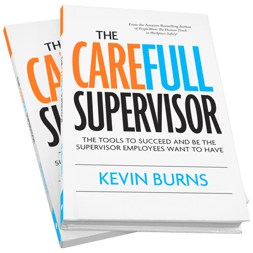Your people deserve your best communication effort. Their safety depends on it.
 The need to be effective in safety communications is perhaps the most important skill any supervisor or safety person can have. It has been proven that managers (including safety managers) and supervisors spend 50-80% of their day in actual communication. 50-80%! Communication is seriously important. If you have to repeat yourself, you're not being effective. And when your effectiveness is lacking, your people aren't buying-in to what you're saying. They're tolerating safety the rules. What you say and how you say it matters. You need to maximize your communication skills.
The need to be effective in safety communications is perhaps the most important skill any supervisor or safety person can have. It has been proven that managers (including safety managers) and supervisors spend 50-80% of their day in actual communication. 50-80%! Communication is seriously important. If you have to repeat yourself, you're not being effective. And when your effectiveness is lacking, your people aren't buying-in to what you're saying. They're tolerating safety the rules. What you say and how you say it matters. You need to maximize your communication skills.
Here are four personal strategies that you need to embrace to begin implementing effectiveness in safety communications:
1One thing at a time. What does that mean? It means ONE thing: one message, one action step, one outcome. 72 PowerPoint slides in a safety meeting is confusing for attendees. They're not taking notes so how are they supposed to know which of the 72 slides are most important? And, trust me, they're not ALL important. Don't try to fix everything at once. The more things you add to the discussion, the more muddled the point of the message becomes. Effective communicators know how to prepare a message with a singular and crystal clear focus. There has to be no question in the minds of your people of what the point of the conversation or meeting was. Ask yourself: what do you want your people to do differently? Then point everything at that ONE thing. If what you're about to say doesn't fit or support that one outcome, ditch it. Don’t muddle the primary message by engaging in information-dumps. Keep it short and sweet. There is no need for stats, figures, charts or graphs. No long boring rambles to make a simple point. In safety communication, people want to know why you're talking to them, what you want them to learn and what you expect them to do with that information.
2Eyeball to eyeball. Look them in the eye. Eyes darting all over the place make people feel like you’re not listening and you’re not interested in what they have to say or ask. Eye contact makes people feel heard and that their concerns or questions matter. You can’t communicate effectively when you’re multitasking. So, don't shuffle papers, don’t look for responses, don't look away, don't interrupt and don't make a judgment. When you are preparing your response before they are done asking the question, you are not listening to understand. If you’re planning in your head what you’re going to say next, you're not focused on them. You’re almost certain to miss nonverbal cues in the conversation. You need to stay focused on the person in front of you. Stop listening to respond and begin to listen to understand. That means focus fully on the person asking the question.
3Show your respect to everyone. Your co-workers may not have your certifications in safety but it doesn't mean that they don't want to be safe. They were probably given bad or muddled information in past (maybe it was by you). Don’t treat them like lesser people because they can't seem to connect with what you want them to do. It's likely that if you're having to repeat yourself that you're not communicating effectively. Besides, everyone has different talents. Some of the people you work with enjoy doing some of the things you don't. Your co-workers deserve your respect. They are people like you, with families who care about them. They deserve to live a life of joy too. You may have the title or certification but that doesn't give you the right to suck up all of the oxygen. You're not the only one who gets to speak. No one person is responsible for safety. Everyone is. So it must be a team effort. Don't treat them like children or less-smart. That will only create an us-versus-them culture. Those cultures do not do safety well.
4Be a minority speaker. A conversation means equal amounts of time speaking - and just as much time listening to understand. But when you're in a position of authority, you tend to speak more than others. Your people may see your conversations more as one-sided lectures. One person talks and everyone else listens. Lectures are not effective communication. I'll bet that there are a good number of your people who feel like you dominate conversations. Conversation are supposed to contribute to understanding. It's no fun when one person speaks all the time and refuses to allow anyone else to speak. Don't be that guy. Instead be a minority-speaker: one who speaks less than the majority of the time. That means you have to train yourself personally to allow others to make their comments. If you want your people to feel like they've been heard, they have to feel like they were given ample time to speak; to state their case or idea. They know you are in charge. You don't have to suck up all of the oxygen proving it. The best leaders sit and listen more than they speak. That's how people feel heard and understood.
Your people deserve your best communication effort. Not giving them your best is lazy and disrespectful. Be prepared. Rehearse. Listen. Always be on-point. Make it all about them and what they need. Their safety depends on it.
Kevin Burns helps organizations integrate caring for and valuing employees through their safety programs. In addition to working with and facilitating discussions between all levels of management and supervisory, Kevin can also give engaging, entertaining and inspiring presentations to front-line employees at safety meetings. Kevin Burns is a management consultant, safety leadership speaker and author of 9 books. He is based in Calgary, Canada.
©2016 ZeroSpeak Corporation and Kevin Burns.
No part of this post may be reproduced without the expressed consent of the author.



